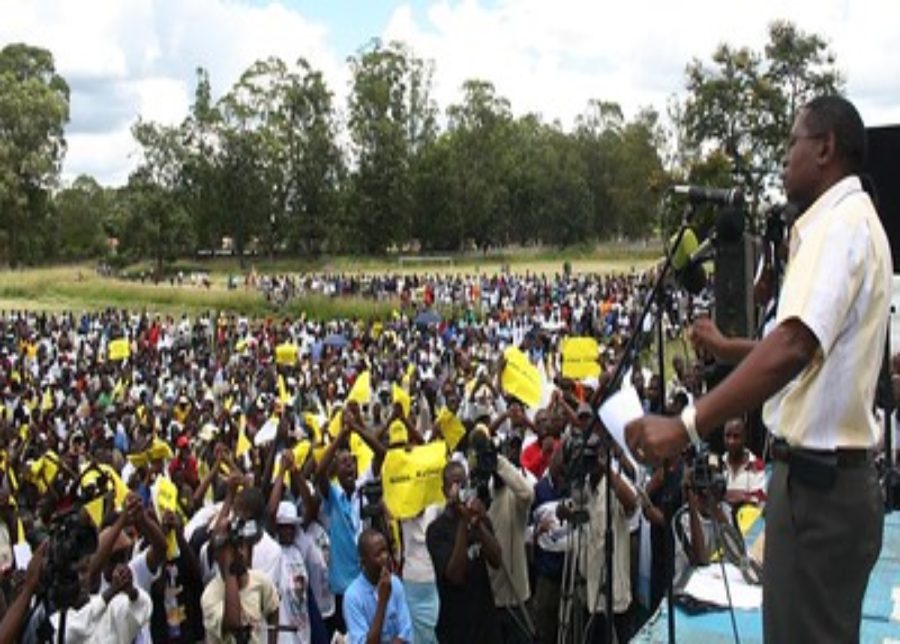
Zimbabwe’s opposition faces obstacles ahead of elections
About 50 Zimbabwean opposition activists clad in yellow T-shirts were knocking on doors and handing out election flyers in Harare when a dozen riot police arrived and told them to disperse. ALSO READ: Zimbabwe opposition launches election rallies after multiple bans For the campaigners, the intervention was one more sign of a strategy to wreck their […]

About 50 Zimbabwean opposition activists clad in yellow T-shirts were knocking on doors and handing out election flyers in Harare when a dozen riot police arrived and told them to disperse.
ALSO READ: Zimbabwe opposition launches election rallies after multiple bans
For the campaigners, the intervention was one more sign of a strategy to wreck their chances of cracking the 43-year grip on power by Zimbabwe’s ruling party.
The landlocked southern African country heads to the polls on August 23 to elect the president, legislature and municipal councils.
ALSO READ: Social media access in Ethiopia resumes after 5-month blackout
OPPOSITION ACTIVISTS
But in a nation dominated since independence by the late Robert Mugabe’s ZANU-PF and burdened by a long history of tainted elections, few commentators expect the vote to be free and fair.
It will be “the facade of an election,” said Nic Cheeseman, a democracy expert at Britain’s University of Birmingham.
“The ruling party has taken steps to control the vote from start to finish.”
Twelve candidates have set their sights on the presidency, but the competition is essentially a race between two men a generation apart, in a country beset by corruption, inflation, poverty and joblessness.
Hardline President Emmerson Mnangagwa, 80, is squaring off against Nelson Chamisa, 45, of the Citizens Coalition for Change (CCC).
Parliament has passed laws that critics say muffle civil society groups and curtail criticism of the government.
Opposition members have been arrested, dozens of CCC events blocked and the party complains of being given little airtime on national television. Fears of vote-rigging are widespread.
ZIMBABWE HAS BECOME ‘DEMORALISED’
The CCC activists had gone last Saturday to knock on doors in Glen View, a working-class suburb of the capital — a tactic that they believed would sidestep the ban on rallies.
But after residents came out to greet the campaigners and started following a car fitted with loudspeakers playing campaign jingles, the police showed up.
They ordered the music to be turned off and people sent home.
ALSO READ: Iranian president visits Zimbabwe ahead of general election
“First they block our rallies and now they are barring our door-to-door campaigns,” CCC activist Rosemary Muriva told AFP.
“We are being demoralised,” the CCC’s candidate for MP, Grandmore Hakata, said despondently.
The mood was starkly different the previous day in the eastern Harare township of Tafara, where gleeful ZANU-PF supporters climbed aboard buses to head to an airport event.
“Our leader is the best. We will go anywhere, any day, to campaign for him,” said Given Mamike, 39.
The same day Mnangagwa received a celebrity endorsement from US boxing great Floyd Mayweather who flew to Zimbabwe at the invitation of a controversial gold dealer and ZANU-PF candidate.
“The president is unbelievable,” Mayweather, sporting a striped scarf in Zimbabwe’s national colours, told local media after meeting Mnangagwa, who replaced the iron-fisted Mugabe in 2017 after a military-led coup.
ECONOMIC CRISIS IN ZIMBABWE
The upcoming race will be a rerun of 2018, when Chamisa narrowly lost to Mnangagwa in a vote that he lashed as a fraud.
The ballot was also stained by a crackdown on protests two days after voting that claimed six lives.
Despite the many challenges he faces this time around, Chamisa, a charismatic lawyer and pastor, hopes to surf a wave of discontent at Zimbabwe’s dire economic situation. a
Inflation in this agriculturally rich country of 15 million people was 175.8 percent in June, according to official figures, but some economists estimate it has topped more than 1,000 percent.
ALSO READ: Richard Branson’s incredible Zimbabwe expedition
Opinion polls are widely varying in their predictions.
Afrobarometer this month gave Mnangagwa an eight percent lead, but a poll by Elite Africa Research put Chamisa about nine percentage points ahead.
The CCC is stronger in disaffected urban areas while ZANU-PF is banking on a strong showing in its rural strongholds, observers say.
Some fear a repeat of the 2018 violence, although, in his campaign messaging, Mnangagwa has insisted on calm.
“What we want is peace and unity,” the president, whose nickname is “The Crocodile” in a tribute to his political skills, told a rally last week.
For Mnangagwa, cementing his leadership will come not just through a convincing majority but also through a large turnout, say commentators.
A Mnangagwa victory is about sending a message to the international community and those challenging him within his party “that he is in charge,” said Brian Raftopoulos, a Zimbabwean political researcher.
The target of western sanctions over graft and rights abuses, Zimbabwe has long sought to climb out of diplomatic isolation.
ALSO READ: Zimbabwe court bans Mugabe’s friend from vying for presidency
“I have never seen a presidential candidate so desperate to win,” said Harare-based political analyst Ibbo Mandaza.
strs-ub/sn/ri
By Mary TARUVINGA with Umberto BACCHI in Johannesburg © Agence France-Presse